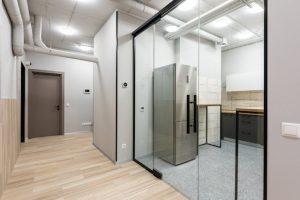In the current landscape where remote and hybrid working arrangements are becoming increasingly popular, the office environment plays a pivotal role in attracting and retaining talent. For businesses, this means creating a workspace that not only meets functional needs but also enhances employee satisfaction and productivity.
A well-equipped office kitchen can be a central part of this strategy. It offers a space where employees can comfortably prepare and enjoy meals, akin to their home kitchens, thus encouraging them to spend more time at the office. This is particularly important as businesses strive to balance the flexibility of remote work with the collaboration and community offered by physical office spaces.
In this article, we’ll explore the essentials every business should consider for their office kitchen.
1. Coffee Machine

For many office workers, coffee is indispensable for starting the day or powering through an afternoon slump. A quality coffee machine gives employees an easy way to get their caffeine fix without leaving the office. It’s a perk that is also highly valued, because assuming the quality on offer is akin to that on the high street, then employees can each save anywhere between £3 – £8 a day, by not spending on their daily fix!
When selecting a coffee machine, consider the size of your office and your team’s preferences. Key features to look for include ease of cleaning, speed, and the types of beverages it can make.
2. Refrigerator

A refrigerator is crucial for storing perishable items and beverages. Whether it’s to keep lunches fresh or to store milk for coffee, having a reliable fridge in the office kitchen is essential. For smaller spaces, compact fridges with freezer compartments are a great option.
However, if space and budget allow, a full-sized fridge can provide ample storage for larger teams. In either case, encourage staff to label their items and periodically clear out expired food to avoid unwanted odours or forgotten leftovers.
3. Microwave

A microwave is a staple appliance in any office kitchen, offering a practical solution for heating meals quickly during lunch breaks. Unlike larger ovens, microwaves take up less space, making them ideal for smaller business environments where kitchen space may be limited.
Additionally, microwaves use significantly less energy and are often much quicker than using an oven, making them a more convenient and energy-efficient option for businesses.
4. Sink and Dishwashing Station

Hygiene and cleanliness are paramount in a communal kitchen. A sink with a good dishwashing station is necessary for washing hands, utensils, and dishes to help maintain a tidy and hygienic environment in communal office kitchens.
Providing basic supplies like dish soap, sponges, and drying racks will encourage employees to clean up after themselves. It can be helpful to establish a cleaning rota or assign someone to regularly check and tidy up the area to prevent the build-up of dirty dishes.
5. Water Dispenser or Filter System
Providing fresh drinking water is essential for employee health and wellbeing. For example, under-sink water filters or countertop filtration systems can provide a steady supply of filtered water.
These water dispenser machines require periodic filter changes, but they are more environmentally friendly and can reduce costs in the long run. 3-in-1 water taps are a convenient solution that allows you to instantly access cold, ambient, and boiling water at the touch of a button – ideal for refreshingly cool drinks and piping hot brews any time of day.
6. Storage Cabinets

Storage cabinets are necessary for keeping the office kitchen organised and uncluttered. These cabinets can be used to store non-perishable items, like snacks and condiments, as well as dishes, utensils, and small kitchen appliances.
If your kitchen has limited space, maximise the available storage by using adjustable shelving, stackable containers, and clear labelling. A well-organised cabinet ensures employees can quickly find what they need without rummaging through cupboards or drawers of unorganised clutter!
7. Kitchen Essentials and Utensils

Stocking the kitchen with essentials like plates, bowls, mugs, and cutlery ensures that employees have the basics they need to enjoy their meals. Additional utensils like knives, chopping boards, and can openers also come in handy.
Investing in durable, reusable options that can withstand frequent use can save money over time and reduce waste. For budget-conscious businesses, consider buying in bulk or sourcing from restaurant supply stores to save on costs.
8. Cleaning Supplies

A clean kitchen is a safe kitchen. Stock up on cleaning supplies such as antibacterial wipes, paper towels, and rubbish bags, and make it easy for employees to find them. It can also be helpful to have a dustpan, brush, and mop available in the kitchen. Don’t forget to follow COSHH regulations for safely storing and handling your cleaning products.
Conclusion
A well-equipped office kitchen is a valuable asset for any business, and also an investment in your team’s wellbeing and productivity. By ensuring your office kitchen has the essentials – from a coffee machine to a well-stocked fridge, reliable appliances, and adequate cleaning supplies – you create a welcoming environment that can boost morale and foster a positive workplace culture. Take the time to evaluate your current kitchen setup and consider how a few upgrades might make a big difference for your team.
Author Profile

- Blogger by Passion | Contributor to many Business Blogs in the United Kingdom | Fascinated to Write Blogs in Business & Startup Niches
Latest entries
 FinanceDecember 8, 2025The Payment Shifts Reshaping How UK Customers Choose Where To Buy
FinanceDecember 8, 2025The Payment Shifts Reshaping How UK Customers Choose Where To Buy MarketingDecember 2, 2025Where do Brits like to shop during Black Friday?
MarketingDecember 2, 2025Where do Brits like to shop during Black Friday? Key ServicesNovember 22, 2025Which is the best Stairlift Company in the UK in 2026?
Key ServicesNovember 22, 2025Which is the best Stairlift Company in the UK in 2026? Must Read NewsOctober 31, 2025How White Hygienic Wall Sheets Brighten Modern Interiors
Must Read NewsOctober 31, 2025How White Hygienic Wall Sheets Brighten Modern Interiors


